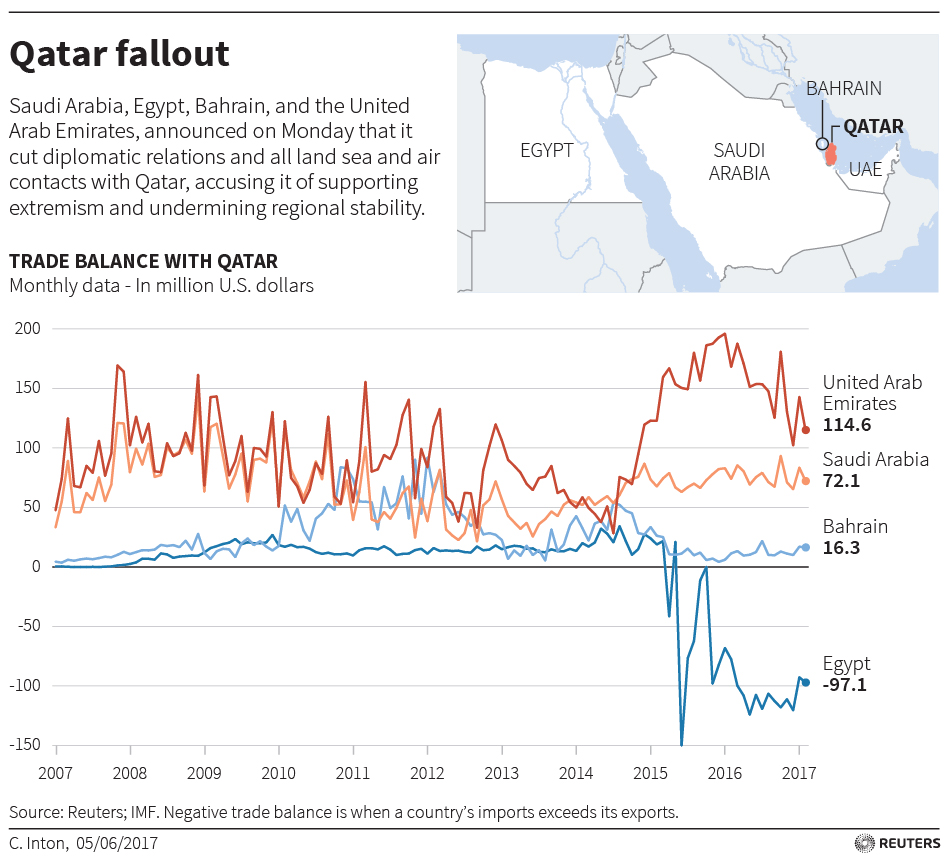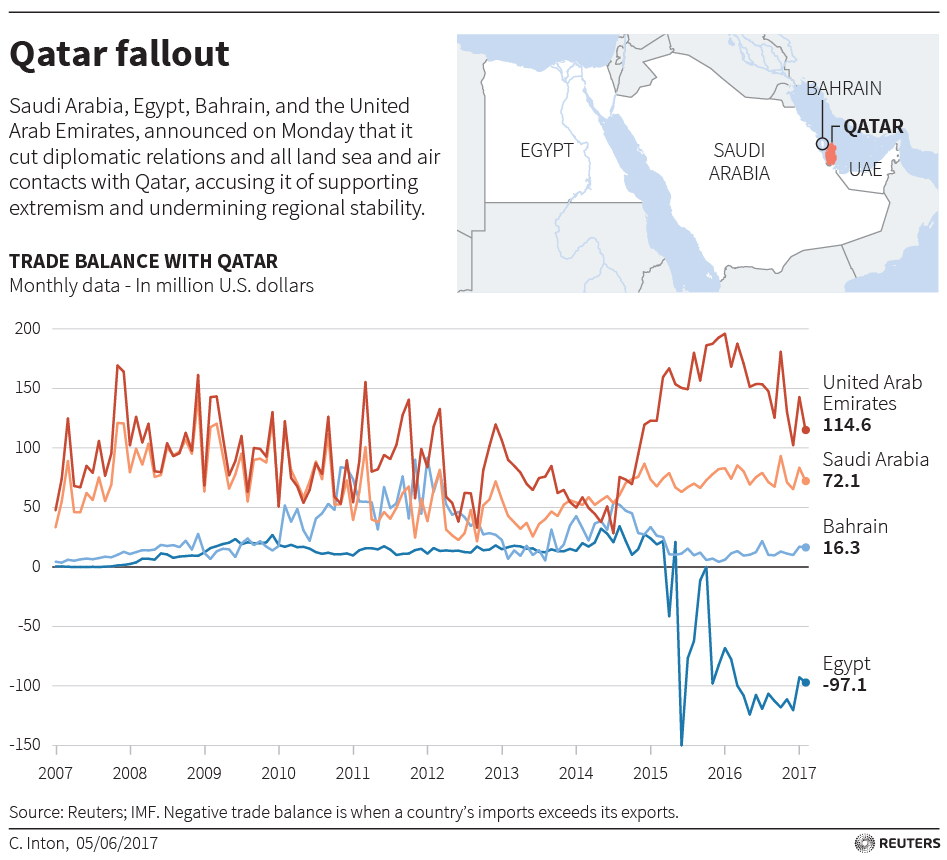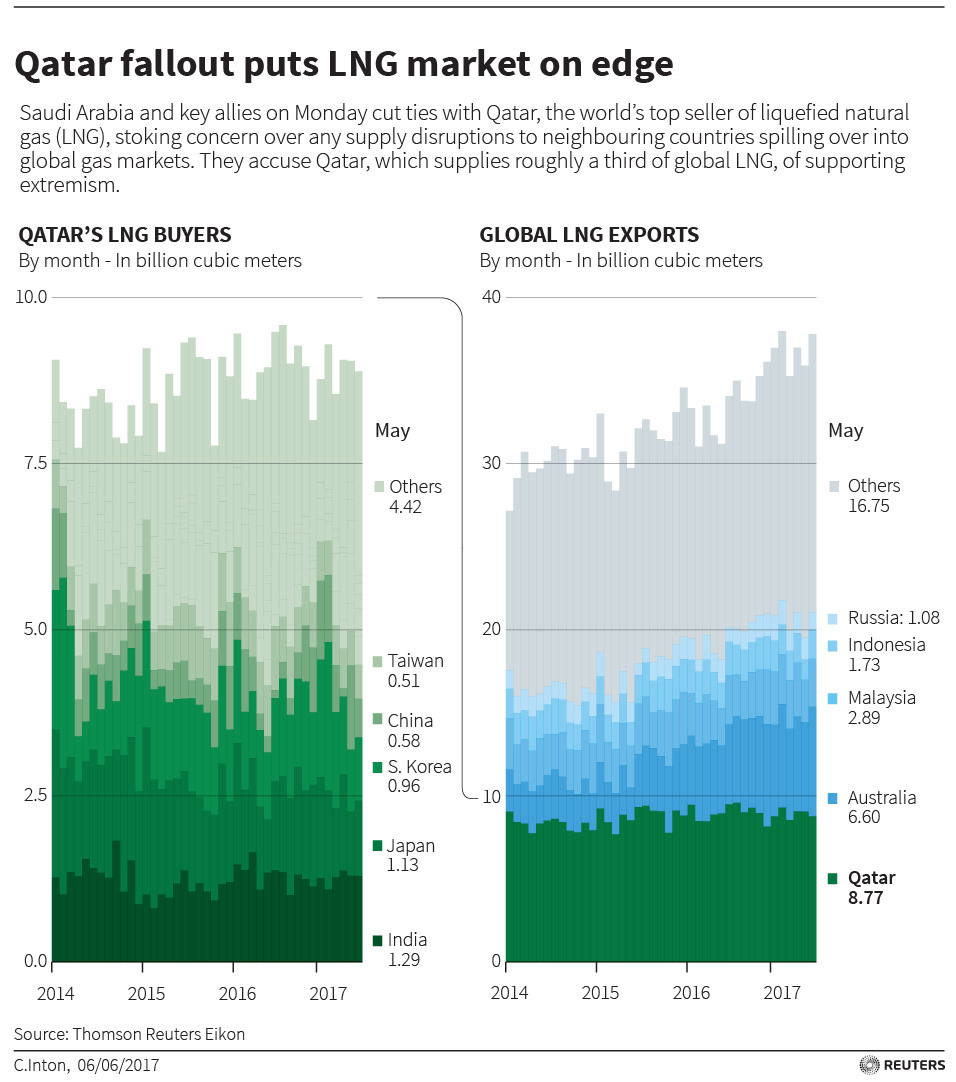
By Tom Perry and Suleiman Al-Khalidi
BEIRUT/AMMAN (Reuters) – Confrontation between Qatar and Saudi Arabia is creating unease among Syrian rebels who expect the crisis between two of their biggest state backers to deepen divisions in the opposition to President Bashar al-Assad.
Together with Turkey and the United States, Qatar and Saudi Arabia have been major sponsors of the insurgency, arming an array of groups that have been fighting to topple the Iran-backed president. The Gulf support has however been far from harmonious, fuelling splits that have set back the revolt.
Saudi Arabia, the United Arab Emirates, Bahrain and Egypt cut diplomatic and transport ties with Qatar a week ago, accusing it of fomenting regional unrest, supporting terrorism and getting too close to Iran, all of which Doha denies.
It is the biggest rift among Gulf Arab states in years.
“God forbid if this crisis is not contained I predict … the situation in Syria will become tragic because the factions that are supported by (different) countries will be forced to take hostile positions towards each other,” said Mustafa Sejari of the Liwa al Mutasem rebel group in northern Syria.
“We urge our brothers in Saudi Arabia and Qatar not to burden the Syrian people more than they can bear.”
The Syrian rebellion can ill afford more internal conflict.
The opposition has been losing ground to Damascus ever since the Russian military deployed to Syria in support of Assad’s war effort in 2015. Assad now appears militarily unassailable, though rebels still have notable footholds near Damascus, in the northwest, and the southwest.
In the fractured map of the Syrian insurgency, Qatari aid has gone to groups that are often Islamist in ideology and seen as close to the Muslim Brotherhood – a movement that is anathema to Saudi Arabia, the United Arab Emirates and Egypt.
Turkey, which has swung firmly behind Qatar in the Gulf crisis, is thought to have backed the same groups as Qatar in northern Syria, including the powerful conservative Islamist faction Ahrar al-Sham.
Qatar is also widely believed to have ties to al Qaeda-linked jihadists of the group once known as the Nusra Front, which has rebranded since formally parting ways with al Qaeda and is now part of the Tahrir al-Sham Islamist alliance.
While Qatar has officially denied Nusra ties, it has mediated the release of hostages held by the group including Americans, Greek Orthodox nuns and members of the Lebanese security forces.
Saudi aid has meanwhile been seen as targeted more closely at groups backed through programs run by the U.S. Central Intelligence Agency – programs in which Qatar has also participated even as it has backed groups outside that channel.
The United Arab Emirates has also played an influential role in that program, together with staunch U.S. ally Jordan. These powers wield more influence in southern Syria than the north.
NORTH-SOUTH SPLIT
“It will increase the split between north and south, as the north is mainly funded by Qatar and Turkey, and the south is supported by Jordan and the (U.S.-led) coalition,” said an opposition source familiar with foreign support to the rebels.
A second opposition source, a senior rebel official, said the Gulf crisis “will certainly affect us, people are known to be with Saudi, or Qatar, or Turkey. The split is clear.”
Adding to rebel concerns, the crisis has also nudged Qatar closer to Iran, which has sent planes loaded with food to Doha. “Any rapprochement between Qatar and Iran, or any other state and Iran, is very concerning for us,” the rebel official said.
A senior Turkish official said it was very important that the Qatar crisis did not take on “further dimensions”.
“These developments will have certain effects on the developments in Syria, its effects will be seen on the field. The elements which Qatar supports may slightly weaken on the field,” the official said.
Opposition sources fear the Gulf crisis could spark new bouts of conflict, particularly in the Eastern Ghouta area near Damascus where the Saudi-backed Jaish al-Islam has been fighting the Qatari-backed Failaq al-Rahman intermittently for more than a year. That quarrel has helped government forces regain parts of the area.
The four Arab states that have turned against Qatar last week issued a list of dozens of people named as terrorists with links to Qatar, including prominent Islamist insurgent Sheikh Abdullah al-Muhaysini, a Saudi national based in Syria known for mobilizing support for jihadist groups.
The U.S. Treasury last year blacklisted him for acting on behalf of and supporting the Nusra Front, saying he had raised millions of dollars for the group.
(Additional reporting by Orhan Coskun in Turkey; writing by Tom Perry; editing by Peter Graff)











